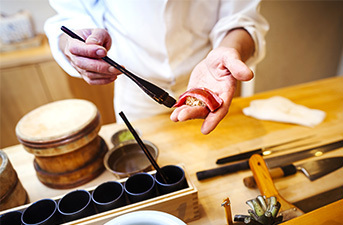Traditional Japanese / Kaiseki / Kappo Restaurants(550)
Yakiniku Kappo Note
This niku-kappo restaurant in upscale Azabu-Juban prepares course after course of succulent A5-grade wagyu beef right before diners' eyes.
Shojin Ryori Daigo
Holding two Michelin stars for a 15-year streak, the traditional vegetarian cuisine at this Tokyo restaurant was called "the best shojin ryori in the world" by The World's 50 Best Restaurants.
Tozentei
The Watanabe family brings fictional kaiseki cuisine to life at their Michelin-starred Kyoto restaurant, located conveniently near the Kinkaku-ji Temple and Arashiyama bamboo grove.
Funaokayama Shimizu
These Michelin-starred kaiseki course menus feature the best ingredients from Japan, but the rice is the real star. Made with Kyoto groundwater from Daitokuji Temple, it is fluffy, fragrant and cooked to perfection in an earthenware pot.

Noguchi Tsunagu
Notorious for being nearly impossible to book, the former two-Michelin-starred Kyotenjin Noguchi has since opened a sister store in Noguchi Tsunagu, offering the same critically-acclaimed cuisine and stellar quality.
Gion Fukushi
Subtraction and simplicity – the husband-wife team behind this pristine Michelin-starred restaurant delivers regionally focused kaiseki in the purest imagination in Kyoto’s storied geisha district.
Higashiyama Muku
The brainchild of a chef with a background in mechanical engineering, the Michelin-starred Higashiyama Muku places emphasis on a multi-sensory dining experience, as well as unadorned, natural flavors using traditional Japanese culinary techniques.
Seiwasou
The beautiful Edo period architecture of Seiwasou draws many guests to its gardens, and the traditional Kyoto-style kaiseki cuisine keeps them at the table.
Nihonbashi Toyoda
While most traditional Japanese restaurants are descended from the Kyoto school, Nihonbashi Toyoda proudly keeps the flame of Edomae cuisine burning. The food of fishermen and dock workers, it is characterized by a stronger, more robust taste.
Tanimoto
A focus on simplicity and delicacy have landed Tanimoto a star in the Michelin Guide for two years. Relying on the basics, owner-chef Tanimoto Seiji wows diners with little more than rice, dashi-based dishes, and fresh seasonal ingredients.
Ganko Takasegawa Nijoen
Admire the Keicho-era grounds and intricate architecture of this historic Kyoto residence, before tucking into wagyu sukiyaki or kaiseki with seasonal ingredients.
Kanazawa Gyokusentei
Sitting at the foot of a scenic hill within Kanazawa's historic Gyokusen-en Garden, Gyokusentei embodies the soul of Japanese kaiseki and Kanazawa’s deep-rooted heritage.
Kawaramachi Izumiya
Opened in 1887, this riverside restaurant has become a Gifu institution renowned for its charcoal-grilled sweetfish, the highly prized fish delicacy often nicknamed "the queen of clear rivers."
The Japanese Restaurant by the Ritz-Carlton Nikko
Easily one of Nikko's most popular restaurants, this aptly-named lakefront restaurant serves up the popular trinity of sushi, teppanyaki and kaiseki alike in the Ritz-Carlton Nikko.
Nikukappo Futago
This restaurant in The Junei Hotel Kyoto serves high-quality wagyu beef in a dizzying number of different ways, from stewed to grilled to even raw, each one more delicious than the last.
Ginza Ugai
Gratitude drives every service here at this Ginza kaiseki restaurant. Chef Ryogo Fujii’s mastery of umami, sweetness and bitterness augments the choice quality of his ingredients, all sourced from an extensive network of suppliers across the country.
Minokichi Shijo Kawaramachi
Kaiseki in its birthplace, a meal at one of the oldest establishments to serve it — the 300-year-old Minokichi brand returns to Kyoto, now serving ultra-seasonal kaiseki in Kawaramachi to showcase the city's culinary splendor.
Nihonbashi Asada (Mitsui Garden Hotel Nihonbashi Premier)
Situated on the ninth floor of the Mitsui Garden Hotel Nihonbashi Premier, this restaurant is a true gem that seamlessly blends traditional Kaga cuisine with modern culinary artistry for a truly unforgettable dining experience.
Jushu
Kansai-style kappo cuisine that’s earned itself a Michelin star. Simplicity is at the heart of Chef Senzaki Masaaki’s cooking, letting the fresh ingredients from his home prefecture of Saga speak for themselves.

Den
Home-style cooking meets Michelin-worthy gastronomic flair right in the very heart of Tokyo.
Yoyogi-Uehara Yu
The supplier comes first at this Yoyogi-Uehara kappo restaurant. Chef Yusuke Imoto’s culinary philosophy focuses on conveying the hard work and passion of his farmers, ranchers and fishermen to the customer with simple, unadorned dishes.
Gion Kurashita
At his Gion restaurant, Chef Kurashita Satoru expertly prepares traditional Kyoto kaiseki, displaying mastery over all ingredients, from king crab and wagyu beef to even the humble tofu.
Horumonyaki Koei Honten
The oldest store in the Koei chain of horumonyaki restaurants, this Kabukicho restaurant is said to draw first-time visitors through the smell of grilling offal alone, and make them repeat customers through its affordable — and delicious — menu.
Rokujo Kawarain San
Storytelling, tradition, and artistry underpin meals at Rokujo Kawarain San, a top-tier kaiseki venue with reasonable prices and seasonal menus.
Kappo Sushi Hana Aza
Three of Fukuoka’s foremost experts in Japanese cuisine depart for an exciting new culinary adventure in the city’s Akasaka district. Novel kappo and sushi creations draw inspiration from cuisine both within and outside of Japan.
Kani Kani Land Kyoto Gion
Originally from Niigata, this restaurant brings the famed snow crab and king crab from off the Sea of Japan's frigid waters to the historic geisha district of Gion in Kyoto.
XEX ATAGO GREEN HILLS / tempura & sushi An
Located in one of the most cosmopolitan areas of Tokyo, this restaurant has an Iron Chef with over 20 restaurants founded as its advisor. Combined with seafood from the finest suppliers in Toyosu, XEX ATAGO GREEN HILLS is an unmissable destination.
Shunwaseki Uoman Nishi-Umeda Main Branch
From Nagasaki to Hokkaido, Shunwaseki Uoman has direct access to Japan’s freshest seafood. Beautifully plated and served up kaiseki-style, each course is then perfectly paired with the restaurant’s formidable sake selection.
